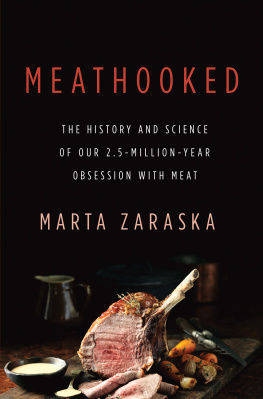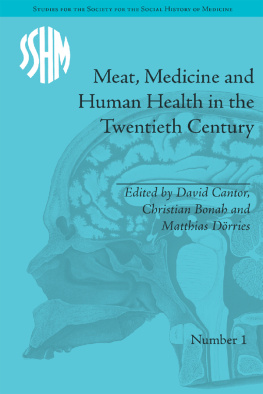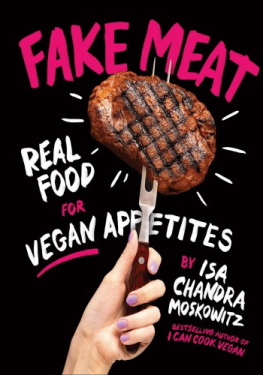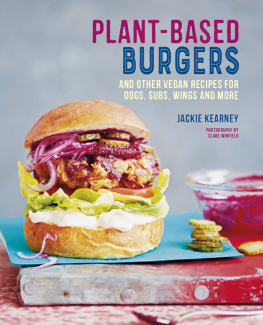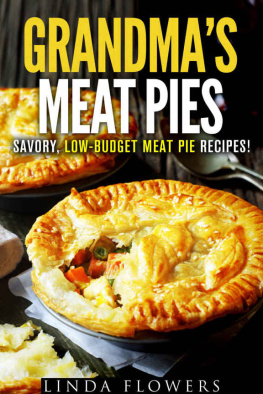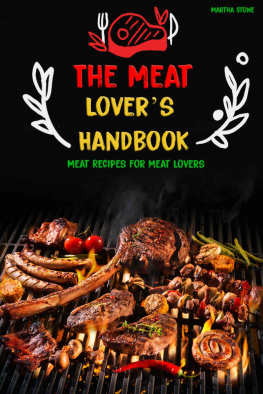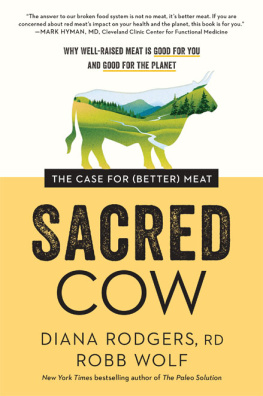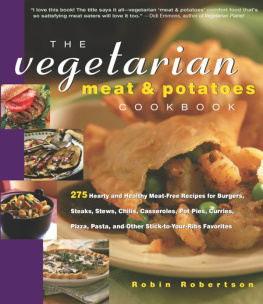More Advance Praise for Meathooked
Meathooked is a fascinating, and often surprising, exploration of the human carnivore. At every step of the way, the story of meat eating is more interesting and more complicated than youd expect. Zaraska provides convincing, and provocative, evidence that we eat meat today for reasons that few people would imagine. It has less to do with nutrition than with culture, marketing, taste and habit. This is a book that every meat eater should read.
Christopher Leonard, Fellow at the New America Foundation and author of The Meat Racket
We know producing and consuming it is terrible for us, the planet, and billions of farm animals, so what keeps people hooked on meat? Marta Zaraskas fascinating Meathooked provides a lively, compelling look at the many reasons humans are addicted to animal protein. Whether youre a vegan, a hardcore meat-lover, or somewhere in between, this book will help you better understand why you and your loved ones eat what you do.
David Robinson Simon, author of Meatonomics: How the Rigged Economics of Meat and Dairy Make You Consume Too Muchand How to Eat Better, Live Longer, and Spend Smarter
Sometimes the secret is asking the right questions. By examining the positive and negative history of meat rather than vegetarianism, Marta Zaraska leads us to a thoughtful and broad array of issues. Meathooked is a book people need to read.
Mark Kurlansky, bestselling author of Salt and Cod
Meathooked
The History and Science of Our 2.5-Million-Year
Obsession with Meat
Marta Zaraska
A Member of the Perseus Books Group
New York
Copyright 2016 by Marta Zaraska.
Published by Basic Books,
A Member of the Perseus Books Group
All rights reserved. Printed in the United States of America. No part of this book may be reproduced in any manner whatsoever without written permission except in the case of brief quotations embodied in critical articles and reviews. For information, address Basic Books, 250 West 57th Street, 15th Floor, New York, NY 10107.
Books published by Basic Books are available at special discounts for bulk purchases in the United States by corporations, institutions, and other organizations. For more information, please contact the Special Markets Department at the Perseus Books Group, 2300 Chestnut Street, Suite 200, Philadelphia, PA 19103, or call (800) 810-4145, ext. 5000, or e-mail special.markets@perseusbooks.com.
Designed by Jack Lenzo
Library of Congress Cataloging-in-Publication Data
Zaraska, Marta, author.
Meathooked : the history and science of our 2.5-million-year obsession with meat / Marta Zaraska.
pages cm
Includes bibliographical references and index.
ISBN 978-0-465-09872-9 (e-book) 1. MeatPsychological aspects. 2. Meat industry and trade. 3. Food preferences. 4. Meat animals. 5. Diet. I. Title.
TX371.Z37 2016
641.3'6dc23
2015027674
10 9 8 7 6 5 4 3 2 1
For Maciek and Ellie
Contents
The Half-Crazed, Sour-Visaged Infidels,
or Why Vegetarianism Failed in the Past
The Pink Revolution, or How Asia
Is Getting Hooked on Meat, Fast
I n the summer of 2009, my mother decided to go vegetarian. She had been living among vegetarians for yearsboth her husband (my stepfather) and his son (my stepbrother) eschew meat. Being a good Polish wife, she would cook them plant-based dinners every night and a separate one, containing meat, for herself. No one pressured her to change her diet, and she didnt seem to mind the additional work. But in 2009 she stumbled upon an article on the health risks of eating meat. The data it quoted, which came from a study of over half a million people, was alarming: high intake of red meat increases a womans risk of premature death due to heart disease by 50 percent and due to cancer by 20 percent. That, my mother thought, was disturbing. She didnt want to clog her arteries with LDL cholesterol (the bad one) and damage her cells with polycyclic aromatic hydrocarbons (carcinogenic substances that may form during the cooking of meat). She pledged to take better care of herself. She was done with meat, she told us.
My mothers resolve lasted about a fortnight. Then the juicy hams and the creamy pts crept back into her fridge. Since that summer she has tried giving up meat several times more, but it has never worked out. Her efforts invariably remind me of my husbands never-ending quest to quit smoking. At some point, when I asked my mother what happened to her vegetarianism, she just shrugged. I like meat, I eat it, end of story.
But for me, it was only a beginning. Several questions were starting to form in my head, questions about our relationship with meat: What is it about animal protein that makes us crave it? What makes it so hard to give up? And if consuming meat is truly unhealthy for us, why didnt evolution turn us all into vegetarians in the first place?
Two years later in early 2011, I was sitting in Eight Treasures restaurant in Singapore, overlooking the hustle and bustle of Chinatown. Through an open window the smells of incense and frangipani flowers drifted in from a nearby Buddhist temple. The world outside simmered with noise, yet the restaurant was peaceful. By then Id been living in Singapore for over two months and was slowly getting accustomed to the culture. But in Eight Treasures I was in for another eye-opener. This was supposed to be a vegetarian restaurant, yet the menu featured exclusively meat dishes: mutton curry, suckling pig, Peking duck, even the notoriously environmentally unfriendly sharks fin soup. Confused, I called the waiter. Do you have any vegetarian dishes at all? I asked. He looked at me as if I were not exactly sane. These are all vegetarian dishes, he said. Me: You mean these pork ribs are not made of, well, pork? The waiter: Everything is fake meat only.
Ah. Here were the key words: fake meat . Soy- or gluten-based mixtures, sometimes flavored with petroleum derivatives. It didnt sound very encouraging, but I took the plunge and ordered pork ribs. And they were delicious. They looked like meat; they had the texture of meat; they even tasted like meat. Im still not 100 percent sure they werent actually made of meat. Perhaps the cooks at Eight Treasures just serve the vegetarians animal protein and fool them into believing it is soy. But what it really made me wonder was this: Why does such an oddity like fake meat exist at all? We dont concoct fake nuts for those who are allergic, nor are there fake carrots for the strict Jains, who avoid root vegetables (they believe pulling them out of the ground is gross violence). So why bother with fake meat? Are we so addicted to animal protein that wed rather eat a meat-substitute curry loaded with chemicals than just enjoy a simple dish of curried vegetables? Whats in the taste of meat or in its social and cultural appeal so that even lifelong vegetarians cant completely give it up?
Today, my mother still eats meat. She is even known to enjoy such Polish delicacies as kaszanka (a sausage made of pigs blood and lungs) and wtrbka (seared cubes of chicken liver). I don t hover over my mothers plate with a scale and a calculator, but if shes like an average Pole, she eats about 156 pounds of meat per year. Americans devour even more: 275 pounds a year, give or take. In the meantime, many scientific journals report on the detrimental health effects of eating meat. According to studies, high consumers of cured meats and red meat are at a 20 to 30 percent increased risk of colorectal cancer. High intake of red meat and processed poultry may raise the risk of diabetes in men by 43 percent and in women by 30 percent. In one widely cited study that followed over 120,000 people, researchers associated higher intake of red meat with an elevated risk of cardiovascular and cancer mortality and estimated that 9.3% of deaths in men and 7.6% in women in these cohorts could be prevented at the end of follow-up if all the individuals consumed fewer than 0.5 servings per day (approximately 42 g/d) of red meat. Meanwhile, studies show that the vegetarian Seventh-day Adventists in California live on average 9.5 (men) and 6.1 (women) years longer than other Californians.

